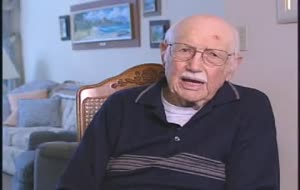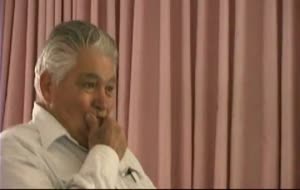Search the Special Collections and Archives Portal
Search Results

Video clip of interview with Raymond Chester Harbert, October 20, 2005
Date
Archival Collection
Description
Moving Image

Video clip of interview with Henry Eloy Peluaga, April 22, 2005
Date
Archival Collection
Description
Moving Image
"100 Years of Influence" interview questions and release forms, approximately 2004 to 2005
Level of Description
Archival Collection
Collection Name: Women of Diversity Productions, Inc. Records
Box/Folder: Box 04
Archival Component

Transcript of interview with Tom Wright by Claytee White, February 14, 2005
Date
Archival Collection
Description
Dr. Tom Wright was born and grew up in Illinois. His father finished his PhD in Chicago and then taught at Illinois College in Jacksonville. His mother suffered from arthritis and was told to seek a warmer climate, so John Wright packed up his family and moved to Las Vegas. Tom was 14, ready for high school, and his two brothers were elementary school age. Tom attended Las Vegas High School, which was close to the Crestwood community where the family had purchased their first home. He remembers that UNLV had no buildings when his dad first started teaching there. Instead, he conducted class in high school classrooms and church Sunday school rooms. Dr. Wright started off at a community college as a Geology Major, but a class with Bud Poland convinced him that history was his passion. He transferred to Pomona to continue his bachelor's degree. He spent his junior year in Peru on a study-abroad program, and that experience made him a Latin Americanist. The information he gath
Text
Paul R. Brown interviews, panel discussions, and event videotapes, approximately 1995 to 2005
Level of Description
Archival Collection
Collection Name: Lori Lipman Brown Papers
Box/Folder: Box 12
Archival Component
Dorothea Overleese oral history interview (OH-01421), 2005 February 13
Level of Description
Archival Collection
Collection Name: History of Nursing in Southern Nevada Oral History Project Records
Box/Folder: Digital File 00
Archival Component
Robert Campbell Jr. "Doc" oral history interview, 2005 March 12
Level of Description
Archival Collection
Collection Name: Nevada Test Site Oral History Project Records
Box/Folder: Digital File 01
Archival Component
Katsumi Furitsu with Janet Gordon oral history interview, 2005 May 13
Level of Description
Archival Collection
Collection Name: Nevada Test Site Oral History Project Records
Box/Folder: Digital File 01
Archival Component
Robert Mackenzie with Kari Chipman oral history interview, 2005 January 05
Level of Description
Archival Collection
Collection Name: Nevada Test Site Oral History Project Records
Box/Folder: Digital File 01
Archival Component
Rosemary Witt oral history interview (OH-02503), 2005 March 11
Level of Description
Archival Collection
Collection Name: History of Nursing in Southern Nevada Oral History Project Records
Box/Folder: Digital File 00
Archival Component
